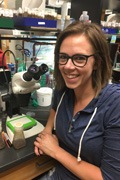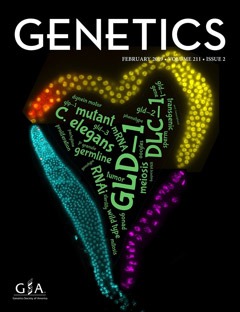2024 Election Candidates and Ballot
To cast your vote, you will need to log in at the link below using your GSA membership email address and password.
You will receive an email confirming your ballot has been submitted (please check the spam folder). If you have technical difficulties, email society@genetics-gsa.org.
Deadline to vote: December 6, 2024 at 10:30 a.m. EST.
Candidate Statements and Biographical Information
Read each candidate’s statement and biographical information at the links below. Return to this list using the “Return to Top” links.
Directors
Vote for one in each section
Director 1
Director 2
Directors
Vote for one in each section
Director 3
Director 4
Geraldine Seydoux

Huntington Sheldon Professor in Medical Discovery, Johns Hopkins University School of Medicine, and Howard Hughes Medical Institute Investigator
Candidacy Statement
GSA has been a pillar of my scientific life and community since scoring my first genetic cross as a graduate student in the 80s with Brenner’s foundational GENETICS article to guide me. Years later, I co-organized the 2003 International C. elegans Meeting in UCLA with the help of GSA staff and witnessed first-hand the incredible behind-the-scenes work that GSA does to support our community. I served on the GSA Board of Directors from 2005 to 2008, as a section editor for WormBook published in GENETICS, and am currently an associate editor for GENETICS.
To serve as Vice President on the GSA Board would be an incredible honor and an opportunity to give forward. My candidacy is grounded in one of GSA’s core principles: empowering today the next generation of scientists, for tomorrow. My years of service as Vice Dean for Basic Research at my institution showed me the challenges that young scientists encounter every day in the face of ever-growing costs and stagnant funding. I envision GSA as a shepherd organization for young scientists, providing them with opportunities for publishing, mentoring, networking, and recognition. I applaud GSA’s restructuring of the GSA Awards to increase inclusivity and reach and to ensure that scientists get recognition at an early career stage when it matters most.
I look forward to working with GSA Journals GENETICS and G3: Genes|Genomes|Genetics to embrace innovation while maintaining high standards of fairness and quality in a rapidly evolving publishing world. I am excited to work with the many research organism communities under the GSA umbrella and extend a warm welcome to emerging models. I see many opportunities in supporting the Model Organism Databases and the Alliance of Genome Resources and interfacing with funding agencies to elevate our long tradition of discovery science. The recent Nobel Prize awarded to Victor Ambros and Gary Ruvkun, both of whom have contributed tremendously to the field and to GSA, reminds us that genetics remains one of the most powerful discovery tools in biology. A vibrant GSA will ensure that many more young scientists join our community and experience the thrill of discovery and of that first cross.
Education
PhD in Molecular Biology and Genetics (1991) – Princeton University
BA in Biochemistry (1986) – University of Maine
Research Interests
My research focuses on the development of the germline and embryonic polarity. My lab identified global inhibition of mRNA transcription as one of the first steps necessary to launch the germline and characterized post-transcriptional mechanisms that promote germ cell identity. We provided evidence that microtubules derived from the sperm aster break symmetry in the C. elegans zygote and trigger the self-organizing PAR polarity system to generate protein gradients by local regulation of protein diffusion. Most recently, our team described a family of intrinsically disordered proteins that stabilize germ granules in the embryo posterior by functioning as surface-tension reducing agents (Pickering agents).
Cassandra Extavour
Timken Professor of Organismic & Evolutionary Biology and of Molecular & Cellular Biology, Harvard University, and Howard Hughes Medical Institute Investigator
Candidacy Statement
“Read this,” he said, “it will change your life.” My undergraduate research advisor handed me a copy of Sydney Brenner’s 1974 masterpiece that established Caenorhabditis elegans as a genetic laboratory model organism. The first scientific paper I ever read was published in GENETICS. Almost more fascinating to me than the 24 pages of worm genetics that I read and re-read that summer, was learning about the phenomenon of scientific publishing: it was incredible to me that one could so easily learn about the intricate details of the work of other scientists, by reading these papers. GENETICS instantly became my favorite journal–I looked forward to the release of each new issue so that I could read it cover to cover, and hoped I would one day do experiments that would be rigorous and insightful enough to be published in its pages.
Many years later, I had the opportunity to participate in the maintenance and growth of the organization that publishes that journal that changed my life–GSA. As a member of the Board of Directors from 2017 to 2020, I learned that the importance and impact of GSA extended beyond its journals and conferences, to include education, training, outreach, and advocacy across multiple career stages. As impressive as the talented and superbly efficient GSA staff were the dozens of scientists who took time away from their own research programs and teaching duties, to volunteer with the Society to strengthen the field, nurture the next generation of scientists, and improve the awareness and lives of non-scientists through genetics research and education.
I am honored now to have the chance to help lead GSA as Vice President. The pursuit of scientific knowledge, the dissemination of accurate and accessible information about genetics, and the ability of people from all walks of life to participate in the scientific enterprise, are increasingly under threat in many regions of the country. I fear that inequities and inaccuracies in science education at all levels and shrinking budgets for our national research funding agencies make scientific careers less and less appealing to young people. These factors and more can also play a role in creating and deepening divisions even within communities of established scientists. I would like to help GSA contribute to strengthening the scientific community both by meeting the needs of those who have already chosen this career, and also by encouraging and welcoming students and early career scientists who are the future of research. Reading GENETICS was the beginning for me, but it won’t be the end–I look forward to helping GSA support the transformative effects that our field can have on science and society.
Education
PhD in Molecular Biology and Genetics (2000) – Universidad Autónoma de Madrid
BSc in Molecular Biology and Genetics (1995) – University of Toronto
Research Interests
My lab is interested in understanding the origins and evolutionary changes in the gene regulatory networks that underlie cell fate choice during animal development.
Modern cellular life on Earth came into being through several major evolutionary transitions. Following the evolution of the cell itself, the transition from unicellular organisms to cooperative multicellular organisms has evolved multiple times independently over the last 600 million years. The success of complex multicellularity lies in cellular division of labor. Stable multicellular life, including all modern animals and flowering plants, would not have been possible without the evolution of genetic programs that specify and maintain many different cell types that work in harmony during the lifetime of an individual, to ensure reproduction and survival of the species over evolutionary time. I have a particular interest in the essential cell fate choice made in the embryos of all sexually reproducing animals: the separation of the cells of the germ line whose cells will directly pass their DNA on to the next generation, from the cells of the soma whose cells will support the germ line but ultimately make no direct contribution of heritable DNA.
My group takes a multidisciplinary approach to this problem. We examine genomes to find the genes that regulate development, characterizing their evolutionary properties and uncovering the stories of their birth. We elucidate how these genes work to regulate development in modern animals, comparing gene functions, biochemical properties of gene products, cellular behaviors, and developmental processes across multiple study species to gain insight into how the genetic control of development evolves. We explore how gene functions and their evolution are influenced by internal ecologies, including diet, intracellular endosymbionts, and gut microbiome. We also ask how external environmental factors, both biotic and abiotic, impact the function and evolution of gene regulatory networks, performing both field work and laboratory studies of field caught specimens.
Because our work examines many scales of biological organization, we deploy many different methods, from field work to laboratory husbandry to quantitative analysis of cells and molecules. Currently the major approaches of my group include invertebrate embryology and developmental genetics, functional genetics in non-traditional arthropod species including RNA interference, CRISPR/Cas9-mediated genome modification, and transgenesis, whole mount multiplexed gene expression including detection of both RNA and protein gene products, molecular biology, quantitative live imaging, metabolomics, computational modeling and simulation, and genomics, bioinformatics, and molecular evolution. We apply these methods to traditional model organisms like Drosophila, optimize them in less well-studied model organisms, and establish them from the ground up for new laboratory model systems that expand taxon sampling across the tree of life and thus improve our ability to discover universal principles of multicellular evolution.
Maureen Barr
Distinguished Professor, Rutgers–The State University of New Jersey
Candidacy Statement
I am thrilled to be considered to serve as Secretary on the GSA Board of Directors. I have a long-standing commitment to use genetically tractable systems to study processes relevant to human development, health, and disease. To me, GSA is home. As a graduate student, I discovered the power of model organisms, starting with studying cancer genes in budding and fission yeast. As a postdoc, I used “the worm” C. elegans to study genes that control behavior, which paved the way for studying the fundamental biology of cilia as a principal investigator. I have spent my entire independent career as a scientist, educator, and faculty member at state universities (University of Wisconsin-Madison and Rutgers University).
I have served in scientific leadership roles locally, nationally, and internationally. For example, I co-organized the first two C. elegans neuroscience topic meetings at Madison-Wisconsin in 2006 and 2008. I served as WormBoard Vice President and President from 2020 to 2023. In 2024, I co-organized GSA’s The Allied Genetics Conference. TAGC 2024 brought together over 3,000 scientists from multiple international biological research communities. I loved working with Harmit Malik, the GSA staff, the GSA Board, the TAGC 2024 organizing committee, and the eight participating communities (C. elegans, Drosophila, Mouse and Rat, PEQG—Population, Evolution, and Quantitative Genetics, Plant, Xenopus, Yeast, and Zebrafish).
GSA and its members are remarkable. As Secretary, I would work with GSA to expand our membership to include new communities and to host exciting, innovative, and inclusive conferences. I am at a point in my career where I want to grow in my leadership and focus on scientific progress and advancement. I would like to help create opportunities for discovery- and curiosity-driven research and to communicate the importance of basic science, which has wide-ranging impacts on human health and our society. I am both an excellent leader and team player. As Secretary, I would work with GSA to advance genetics, and genetics/genomics-based research, and to expand genetics education and outreach.
I am devoted to the education and mentoring of undergraduate, graduate, and postdoctoral trainees and deeply committed to the mentoring, advancement, and promotion of junior faculty members (tenure track and research track) in my department, my university, and the scientific community at large. My greatest successes are those of my trainees and my colleagues. As Secretary, I would work with GSA to continue to foster and promote early career researchers and their professional development. My home university Rutgers-New Brunswick is one of the most ethnically diverse public universities in the United States, reflecting the population of New Jersey. As Secretary, I would work with GSA to prioritize equality, equity, and inclusion within our communities, our events, and our journals.
Education
PhD in Genetics and Development (1995) – Columbia University
BA in Biology (1990) – Rutgers University
Research Interests
My research program uses the nematode C. elegans to study fundamental questions in cell biology and to model human genetic diseases of cilia. We discovered the first link between cilia and human disease and helped ignite the field of cilia and ciliopathies. We tackle important problems that are biomedically relevant and have a track record of fundamental discoveries using genetics. Our studies have guided research into autosomal dominant polycystic kidney disease and other ciliopathies. We also established an in vivo model to study ciliary degeneration and regeneration, which may contribute to human neurodegenerative diseases. Most recently, we pioneered the use of C. elegans as a system to study extracellular vesicle (EV) biology in an intact living animal. EVs are shed by all three kingdoms of life and most if not all cells in the human body. As such, EVs play important roles in development, health, and disease, and are major contributors to cancer, neurodegeneration, infection, inflammation, and immunopathogenesis. EVs have clinical and translational applications given their use as disease biomarkers and therapeutic delivery vehicles. I think the EV field is currently where the cilia field was 25 years ago – poised for a tsunami of breakthrough discoveries.
C. Brandon Ogbunu

Assistant Professor, Yale University
Candidacy Statement
It is my belief that my combination of experiences with GSA, my professional preparation, and alignment with the vision and goals of the Society make me a strong fit for the position of Secretary for the GSA Board of Directors.
I had the distinct honor of serving on the GSA Board in 2023. In this role, I participated in several subcommittees, including the Nominations Committee, the Education Committee, and the Public Communications and Engagement Committee. Additionally, I served on the organizational committee for the 2022 Population, Evolutionary & Quantitative Genetics Conference (PEQG), a conference where I once served as session chair in 2020. Most recently, I was appointed a senior editor at GENETICS.
In sum, these experiences speak to my familiarity with GSA’s central operations, and alignment to its missions and ambitions. I am further compelled to amplify my participation because of the current cultural moment. As we enter a “post-genomic” era, the greater fields of genetics have begun to reflect on a new suite of issues related to both science and the world in which they are embedded. This includes the rise of genetic modification, genomic prediction, and the ethical concerns related to genetic determinism (e.g., in embryo selection), and scientific racism. Whether it be these or many other contentious issues, it is a critical time for scientific institutions like GSA to assert themselves as a voice of reason in an increasingly complicated world of information exchange. I aim to support the organization’s efforts to promote inclusion, protect and amplify model systems, and continue to modernize how science is discussed with the public.
As Secretary, I would be tasked with retaining the record for GSA proceedings and gatherings, and providing technical and organizational input on meeting structure, protocol, and documentation. This is especially important today because of the many creative individuals and ideas that circulate throughout the Society. More than anything, the job requires attentiveness and professionalism, two traits that I hope can be used to describe my contributions across the scientific community. I will work to facilitate productive dialogues between the leadership and the membership, in a manner that maintains the daily operations of the organization and creates space for generative discussions and innovative programs and initiatives.
Education
PhD in Philosophy (2010) – Yale University
BS in Chemistry (2002) – Howard University
Research Interests
I am an Assistant Professor in the Department of Ecology and Evolutionary Biology at Yale University, and an External Professor at the Santa Fe Institute. I’m a computational biologist whose research investigates complex problems in epidemiology, genetics, evolution, and the interface between science and society. My work utilizes a range of methods, from experimental evolution, to applied mathematics, and biophysics, all towards a refined understanding of complex biological and social systems.
Judith Yanowitz

Professor, Developmental Biology, Microbiology and Molecular Genetics, University of Pittsburgh School of Medicine
Candidacy Statement
Where would the genetics community be if GSA ceased to exist? I have asked myself this question many times over the last month as I have deliberated running for the GSA Board of Directors. The Society is a central pillar of my scientific community. I deeply value the work they do to support our community through a vast range of professional development activities, from organizing our meetings, supporting publications of scholarly work, to providing funding for travel, community engagement, and educational activities. To champion and grow these myriad activities, I am honored to be running for a position on the GSA Board.
I fell in love with chromosomes while reading Barbara McClintock’s seminal papers for journal club as a technician in New York City, but it was not until graduate school that I truly discovered my passion for genetics. Since then, the genetics community has been my scientific home. Over the past five years, as a member of WormBoard and currently as its president, I have worked on multiple initiatives including the establishment of the Sydney Brenner Dissertation Thesis Award, diversifying participation in the organization of our meetings, supporting global worm community initiatives (WormBook, WormBase, international meetings, etc.), initiating efforts to build a pipeline of genetics researchers by recognizing undergraduate research especially from underrepresented communities, and building capacity to promote and advocate for greater societal investment in research. I have also held leadership roles at the Magee-Womens Research Institute (MWRI) serving for the last six years as MWRI Director of Research Education. In this role, I expanded our educational programs to engage local high school teachers and increased diverse participation in our summer programs. I also serve as a mentor in Springboard, a program for new faculty in Pitt health sciences, and recently became PI for our BIRCWH K grant program.
If elected, I will prioritize several key issues to support the health and vitality of our organization. It is important to advance genetics research by promoting cross community interactions. I joined GSA as a graduate student in a fly lab and then moved into the worm community as a postdoc (and beyond), and found homes in both organism meetings and communities. Following GSA’s recent decision to not hold The Allied Genetics Conference again, we must seek new and innovative ways for our broader communities to continue interacting, thus supporting the cross pollination of ideas. As a Board member, I will work to create pathways that promote interactions both across established genetics communities and with communities that are currently underserved by major societies. I will also focus on ensuring GSA’s sustainability. For over a century, GENETICS has been home to some of the most rigorous and important science in our field–if elected, I will work hard to help the Society navigate the ever-changing publishing landscape while identifying creative ways for the journals to evolve and grow, driving the continued success of our publications and continuing to serve our constituents.
The field of genetics needs new and junior scientists and we must recruit from a broader swath of society. GSA has done an incredible job developing tools for professional development. If elected, I will work to expand the reach of our mentorship and training programs to a more diverse group of scientists and engage the international genetics community. I will also continue to support GSA’s work to create inclusive environments where we acknowledge our challenging histories with genetics research and how this may have disenfranchised minority communities.
It would be my honor to serve on the GSA Board to help promote the promise and impact of genetics research for societal benefit. We must amplify the successes and vision of genetics research through civic engagement, critical to the expansion of research funding and to building greater societal trust in science, at a time when it’s greatly lacking. I hope you give me this opportunity to serve our community, and I look forward to working with you and GSA.
Education
PhD in Molecular Biology (1999) – Princeton University
BS in Biology (1991) – Massachusetts Institute of Technology
Research Interests
The oocyte is one of the most fascinating cells on the planet: on one hand it has to perform the complicated meiotic dance; on the other, it has to build the infrastructure that supports embryonic growth. My lab studies various aspects of meiosis and germ cell development (and occasionally some other stuff) using C. elegans (and now some other worms too). Much of the work in the lab over the last decade has focused on the first step in meiotic crossover formation, the catalysis of the double-strand break. While SPO-11 makes the break, it is assisted by nearly a dozen accessory factors that determine the timing, placement, and number of breaks. Our cloning and characterization of nearly half of these factors in the worm led us to discover a cis-acting, chromosome surveillance system that ensures that each chromosome receives a crossover. Current projects in the lab include the evolution of the accessory factors across Caenorhabditis, characterizing new fertility factors from a screen of the disordered proteome, and determining the interrelationship between DNA repair pathways in the germ line.
Carolyn Phillips
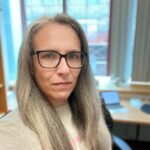
Associate Professor of Biological Sciences, University of Southern California
Candidacy Statement
I’m honored and excited to be nominated for a position on the GSA Board of Directors. As a passionate advocate for genetics research and education, I believe that my experience and vision align with GSA’s mission to advance the understanding of genetics in all its forms. Throughout my career, I have been dedicated to both scientific discovery and community engagement. My research program, initially developed as a postdoc in Gary Ruvkun’s lab, has focused on understanding mechanisms of small RNA-mediated gene silencing in C. elegans. I have published on multiple occasions in GENETICS and G3: Genes|Genomes|Genetics and have recently become more involved with GSA as an associate editor for GENETICS. This position has provided me with valuable insights into the publication process, the importance of rigorous peer review, and the need to highlight diverse research contributions.
My association with GSA started in 2003 when as a second-year graduate student in Abby Dernburg’s lab at UC Berkeley, I attended my first conference and presented my first poster at the International C. elegans Meeting. Two years later, I had the privilege of giving my first talk on the plenary stage in Royce Hall at the 2005 International C. elegans Meeting. These experiences not only shaped my career but also underscored the importance of an extended mentorship network and a welcoming community in our field. I am passionate about teaching undergraduate and graduate students and mentoring at all levels, and I have extensive mentorship experience, including through the University of Southern California (USC) Jumpstart Summer Research Program, the C. elegans Community Mentor Match Program, and currently as the Director of Graduate Studies for the USC Molecular Biology PhD program. These roles have reinforced my commitment to supporting the development of early career researchers and fostering an inclusive environment for all scientists as well as my belief in the power of collaboration and communication in advancing our field.
If elected to the GSA Board, I would prioritize a series of issues. First, I would support recruitment, mentoring, and professional development as I am committed to supporting mentorship programs and providing resources for professional growth of early career researchers, with the goal of empowering the next generation of geneticists. I would promote inclusivity and diversity, advocating for initiatives that enhance diversity within our membership and leadership, which is critical to strengthen our community and ultimately enrich our collective research efforts. I would support parents and caregivers through work to establish resources and initiatives that support parents and caregivers in our community. By creating a more accommodating environment, we can help balance professional responsibilities with family needs. Finally, I would focus on advancing public understanding of genetics as I am dedicated to promoting genetics education and awareness among the public. By partnering with educational institutions and leveraging digital platforms, we can demystify genetics and inspire the next generation of scientists.
I am excited about the opportunity to leverage these experiences to serve as your Director and contribute to the future of GSA.
Education
PhD in Molecular and Cell Biology (2007) – University of California, Berkeley
BS in Biological Sciences (2001) – University of California, Davis
Research Interests
In the Phillips lab, we use C. elegans as a model organism to investigate how small RNAs facilitate proper gene expression while maintaining germline integrity and totipotency. Our research is driven by the understanding that small RNAs play crucial roles in gene regulation and are integral to safeguarding the germline against genetic instability. A major focus of our work is to elucidate the spatial organization of the RNA silencing pathway within the germline. We emphasize the significance of perinuclear germ granules, which serve to compartmentalize the various steps of RNA silencing. By studying these structures, we aim to uncover how they contribute to the efficiency and regulation of RNA silencing mechanisms. In addition to spatial organization, we are also interested in identifying factors that promote specificity in RNA silencing. This includes exploring the roles of post-translational modifications and protein-protein interactions that influence the activity and target recognition of small RNAs. Through our research, we aim to provide a comprehensive understanding of how these processes work together to ensure precise gene regulation and the maintenance of germline integrity.
Wu-Min Deng
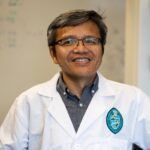
Gerald & Flora Jo Mansfield Piltz Endowed Professor in Cancer Research, Tulane University School of Medicine
Candidacy Statement
I am running for this position to promote the vital role of model organisms in advancing both basic and translational biological research. My career, spanning from early studies on oogenesis to recent work in tumorigenesis, has consistently demonstrated how model organisms like Drosophila drive transformative discoveries in developmental biology and cancer research. I bring extensive experience in service roles, including participation on NIH study sections, editorial boards, the Fly Board, and as a conference organizer, as well as holding various institutional and community leadership roles. Having worked in both a biology department and a cancer research center has equipped me to engage with researchers across diverse fields and to effectively advocate for the unparalleled insights model organisms provide.
I have experience promoting communication and collaboration among research labs across regions, particularly by engaging researchers from underrepresented areas. For example, I helped establish the “Fly Bayou” community, connecting Drosophila researchers across the southeastern United States and beyond. This initiative has strengthened our community by uniting labs across geographical boundaries, creating a model that can be expanded to promote diversity in other regions, model organisms, and research topics. If elected as a GSA Board member, I will continue using my experience to broaden the reach and support for model organisms in groundbreaking research, enhancing our community’s contributions to addressing critical questions in biology.
Education
PhD in Developmental Biology (1997) – The University of Edinburgh
BS in Genetics (1991) – Sichuan University
Research Interests
The research in my laboratory bridges genetics, cancer biology, and developmental biology. Using the genetically tractable Drosophila model, we seek to understand how cell growth, proliferation, and polarity are regulated during development and how their deregulation may result in uncontrolled growth, loss of tissue integrity, and neoplastic tumor transformation. Currently, we focus on several research projects including characterization of “tumor hotspots,” the tissue microenvironment that fosters tumorigenesis; investigating the sex dimorphism in tumor growth and the tumor-host response; exploring the transformation of follicle cells into non-professional phagocytes; and examining the involvement of polyploidy in development and cancer.
Jeff Sekelsky

Professor of Biology and Professor of Genetics, University of North Carolina at Chapel Hill
Candidacy Statement
I consider myself to be a strong proponent for GSA. I’ve been a member of the Society since I was a second-year graduate student in the lab of Bill Gelbart 35 years ago. In that time, I’ve gone to almost every Annual Drosophila Research Conference and to every TAGC, and I usually send all my students and postdocs. I recently stepped down after being on the GENETICS editorial board for 16 years, eight as associate editor and eight as senior editor for the Genome Integrity and Transmission section.
I realized early on that my most important jobs are mentoring and teaching. My lab has been the training site for 12 postdoctoral fellows, 17 former PhD students (three were co-mentored), four current PhD students (one is co-mentored), and more than 100 postbacs, undergraduates, and high school students. I’ve participated in mentorship training, including culturally aware mentoring. My mentoring advice is: “Every student is different and none of them are you.” I try to work with each trainee to determine what project is the best fit (even if it means making up a new one) and what mentorship style works best for them. I directed a large, interdepartmental PhD program in genetics for 12 years and for six years, participated in a study section that reviews T32 training grants, serving as chair during the final year. I was recognized with awards for mentoring and for directing the PhD program. The highlight of my career came a couple months ago when former trainees organized a 25th anniversary lab reunion (with awesome t-shirts).
I hope that my experiences help me provide valuable insights on issues related to training, publishing, and other topics of concern to GSA members.
Education
PhD in Biology (1994) – Harvard University
BA in Biochemistry (1984) – University of Wisconsin
Research Interests
Research in my laboratory investigates mechanisms and regulation of meiotic and mitotic recombination. We primarily use genetic and molecular approaches in Drosophila, but have also incorporated biochemistry, cell biology, and genomics. Projects of my current PhD students include whole-genome sequencing of chromosomes that failed to properly segregate in meiosis; investigation of mechanisms by which centromere-proximal meiotic crossovers are suppressed, revealing mechanisms for repair of large DNA gaps through APOPEC-induced mutagenesis; and studies of the effects of histone tail mutations on mitotic recombination frequency and position.
Heather Bennett
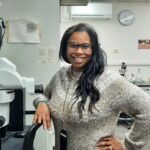
Assistant Professor of Biology, Trinity College
Candidacy Statement
I am honored to be nominated to run for the GSA Board of Directors. My scientific journey began after graduating college. I completed independent research with Stefania Gallucci at the University of Pennsylvania, using diverse mouse models to study immune antigen presenting cells, dendritic cells, and their role in Systemic Lupus Erythematosus. I began to ask many questions that were rooted in genetic mechanisms and beyond the scope of the lab. As a result, I was encouraged to apply to interdisciplinary graduate programs. In graduate school at Brown University, I completed my PhD with Anne Hart, using C. elegans to study the genetic pathways that regulate compensatory sleep mechanisms. At present, I am an assistant professor at Trinity College, a primarily undergraduate institution (PUI) where I teach several undergraduate science courses, incorporating C. elegans in my research program and in the classroom.
I have been affiliated with GSA for nearly 13 years. My involvement began as a graduate student serving as a trainee representative in the GSA Education Committee. In this position, we discussed initiatives and strategies to make science education more accessible and engaging to younger students as well as opportunities to increase undergraduate student participation in national conferences. As a tenure track faculty member, I served as an inaugural member of the C.elegans Mentor Match Program organizing committee. This initiative looks to foster diversity, equity, and inclusion within the Worm community by establishing mentoring relationships for graduate students, postdoctoral scholars, and junior faculty with established research faculty and scientists at other institutions. In 2021, I was elected as the minority representative to WormBoard. Recently, I served on The Allied Genetics Conference 2024 PUI subcommittee, where I provided suggestions on workshops that would benefit PUI faculty research and facilitate undergraduate student engagement.
Collectively, I mention these experiences to emphasize my commitment and enthusiasm surrounding these topics, as well as highlight my ability to collaboratively work in groups both large and small, to develop sustainable strategies to support scientists and educators. I would be honored to serve on the GSA Board to advance the overall mission of GSA. If elected, I would focus on three areas including inclusion, advancing genetics research, and engagement and education.
I have mentored numerous students, many from underrepresented minority (URM) backgrounds. As an African American woman in science, I am fully aware of the challenges individuals may face when there is a lack of adequate representation and how this might influence the retention of our trainees. As a result, I have dedicated significant time toward learning more about inclusive teaching and mentoring practices, as well as how to foster inclusion in laboratory settings. In my role with the Board, I will work to listen and advocate for more programs that support and engage underrepresented groups both nationally and internationally. Continuing to advance genetics research by fostering opportunities for early career and established scientists is also key. If elected, I am committed to ensuring the work of scientists doing research in genetics is visible and to advocating for more funding opportunities to support this research. It is also essential that we continue to mentor the next generation of scientists, providing opportunities and guidance at each stage of their scientific career.
Finally, for science to be impactful it must be shared. If elected, I will support the development of innovative resources that promote science literacy and initiatives that expand training and provide opportunities for scientists to engage with the public. I also believe it’s important to engage and collaborate within the field of genetics between the model organisms to foster community.
Education
PhD in Molecular Biology, Cellular Biology, and Biochemistry (2015) – Brown University
BS in Biology (2006) – Stockton University
Research Interests
My laboratory is interested in understanding the genetic pathways and molecular mechanisms that allow C. elegans to adapt to and survive stressful insults like oxygen deprivation. In C. elegans, insufficient oxygen (hypoxia) or complete lack of oxygen (anoxia) can lead to cell dysfunction and prolonged lack of ambient oxygen can result in death. The genetic and molecular mechanisms that allow C. elegans to mount a coordinated response to oxygen deprived environments have not been fully described. Neuropeptides, small non-classical neurotransmitters, have been implicated in mediating the response to hypoxic and anoxic conditions. We find loss of function in specific neuropeptide genes can confer resistance and increase survival to anoxia. However, the biologically-relevant cells where these neuropeptides function and genetic pathways involved are unknown. My laboratory aims to elucidate the genetic and molecular pathways underlying the neuropeptide response that lead to increased survival to anoxia.
Elizabeth Ables

Associate Professor of Biology, East Carolina University
Candidacy Statement
I am honored to be nominated for the GSA Board of Directors. I’ve been a member of GSA for over 15 years. At every step of my career track, from trainee to faculty member, GSA has been a constant source of guidance, mentorship, and opportunity. From participation and organization of research workshops in GSA-sponsored conferences to publication in GSA Journals, meetings and interactions within the GSA community were crucial to my personal development as a researcher. I’ve also been an active advocate for the inclusion of undergraduate researchers into the GSA community and my trainees have benefited from the resources and funding provided by GSA to present their work and build their own research networks. I look forward to serving the GSA community as it seeks to elevate genetics awareness globally and continues to bring the genetics community together in pursuit of novel and important research.
As a Board member, one of my goals will be to help expand the role of GSA in genetics education. As personalized medicine becomes more commonplace in the clinic, it is more important than ever that our medical professionals understand the basic underpinnings guiding genetic inheritance and gene expression. As geneticists, we have the power to block misinformation by accurately teaching genetics research to the undergraduates who will go on to power our medical community. Thus, GSA has an important responsibility to break down the communication barriers between genetics research and undergraduate education. As a scholar and teacher at a large, regional, rural, public university, I see my participation on the GSA Board of Directors as an opportunity to speak up for those researchers who dedicate their time and energy to teaching genetics to undergraduates. I’m interested in helping to expand resources for educators like the GSA PREP and CourseSource and encouraging active GSA members to share their ideas and resources on these portals. This could be achieved, at least in part, by growing mentoring and networking opportunities between researchers and educators that help make primary research more accessible for discussion in introductory undergraduate classrooms. I’d also like to help GSA explore ways to break down financial and time barriers that currently limit undergraduate participation in GSA conferences, and to promote discovery and innovation at diverse academic institutions.
My overall goal is to help GSA continue to build an inclusive community and seek out impactful ways to integrate undergraduates and early career trainees into the field of genetics through expanded education and research opportunities.
Education
PhD in Molecular Physiology and Developmental Biology (2007) – Vanderbilt University
BS in Biology (1999) – St. Andrews Presbyterian College
Research Interests
Stem cells are dependent upon organismal nutrient sensing systems to balance their unique properties of self-renewal and the production of specialized progeny, allowing for the replacement of cells lost by attrition, regeneration, repair, or remodeling. Stem cell proliferation rates and maintenance of stem cell population size are tightly controlled by the integration of signals from the local environment (or niche) and systemic signals, such as steroid hormones, which fluctuate in response to nutrient intake and other physiological inputs. My lab uses the Drosophila melanogaster ovary, a well described stem cell–based tissue that responds to external stimuli, as a powerful model system to study the molecular mechanisms controlling stem cell activity in vivo and provide a supportive, hands-on training environment for students entering research careers. We use genetic and cell biological approaches to assess in vivo the mechanisms by which steroid hormones control ovarian stem cell proliferation and differentiation. Our long-term research goal is to understand how steroid hormone signaling is integrated into spatially-regulated local signaling pathways to finetune stem cell activity in response to physiological demand.
Kirk Lohmueller
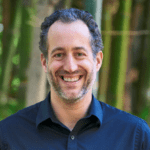
Professor of Ecology and Evolutionary Biology and Human Genetics, University of California, Los Angeles
Candidacy Statement
I am honored to have been nominated for the GSA Board of Directors. I am excited to have this opportunity to help shape the future of this scientific society. My connection to GSA began as a graduate student, when I realized the journal GENETICS had published many of the groundbreaking papers in population genetics. I looked at GENETICS with a degree of reverence and still feel a sense of awe when my work is published in this esteemed journal. Since that time, I have contributed to both GENETICS and G3: Genes|Genomes|Genetics as an author and reviewer. Another way that GSA has enhanced my own scientific growth is through its conferences. I have attended The Allied Genetics Conference and Population, Evolutionary, and Quantitative Genetics (PEQG) conferences over the years. As my own research focuses on understanding evolutionary processes in a myriad of model and non-model species across the tree of life, I am drawn to the fact that GSA encompasses many of the traditional model organisms as well as the more process-oriented community. The PEQG conference, in particular, is special in how it blends quantitative genetics and population genetics.
If elected to the Board of Directors, I aim to work collaboratively with other Board members and Society members, really taking into account the community’s input, to maintain the excellence of the GSA Journals and GSA Conferences. Beyond their storied history, I believe both GENETICS and G3 continue to add tremendous value to our community. My first goal would be to maintain the constructive peer review and quality of papers, even in the changing publishing landscape. Second, I would like to increase connections between the model organism communities, while still enabling each to have its own scientific identity. With TAGC no longer meeting every four years, we will need other creative ways to enhance these connections, perhaps with smaller satellite meetings focused on particular topics of interest for several communities. Third, as GSA Conferences play a key role in training the next generation of scientists, I hope to increase the opportunities for early career researchers to present their work and gain visibility within their communities.
Throughout my time as a faculty member at University of California, Los Angeles (UCLA) since 2013, I have engaged in a number of service and leadership roles that have prepared me to serve on the GSA Board. For example, at UCLA, I served on and chaired numerous faculty search committees, graduate student admissions committees, and on academic personnel committees. From 2020 to 2021, I was the Vice-Chair of my department, in charge of academic personnel. More broadly, I have served the larger scientific community as a standing study section member on an NIH R35 review panel. I have served as an academic editor for Evolution and currently serve as an academic editor for Genome Biology and Evolution, PLoS Genetics, and PLoS Computational Biology. I am grateful for the nomination to run for the Board of Directors and hope to have the opportunity to contribute my time and experience to a scientific society that has been an integral part of my own scientific journey.
Education
PhD in Genetics (2010) – Cornell University
BS in Biology (2005) – Georgetown University
Research Interests
I am a population geneticist whose research focuses on developing and implementing computational approaches to understand the causes and consequences of genetic variation in natural populations in a wide array of species. While my research group is entirely computational, we focus on addressing biological questions using large-scale genomic data. We develop our own new statistical approaches when existing tools are not well suited for the particular questions or data. Much of our recent work focuses on building models of evolutionary processes to better understand deleterious genetic variation in a variety of species and populations. I am especially interested in inferring evolutionary parameters pertaining to deleterious mutations and understanding how population history affects patterns of deleterious mutations in different populations. My lab also studies how deleterious mutations influence fitness in small populations of conservation concern and how deleterious mutations affect the architecture of complex traits. Our work is primarily funded by the National Institutes of Health, with additional support from the National Science Foundation and other funding organizations.
Christian Mosimann

Associate Professor of Pediatrics, University of Colorado School of Medicine
Candidacy Statement
I am honored to be nominated to contribute to the GSA Board of Directors. Genetics is the thread that connects numerous biological disciplines and motivated me to pursue a career in biology, studying a variety of topics including wing disc patterning and signaling and cardiovascular development, disease, and evolution. Having trained and run my lab in two continents, I repeatedly witness the power of genetics to motivate inclusive science, exciting collaborations, and the introduction of young talent to the fascination of biology. GSA, with its diverse community and meetings, is ideally positioned to advocate for, support, and connect model organism research both nationally and internationally.
I have benefited from GSA’s diverse community since my graduate student days working on Drosophila. Applying zebrafish in my lab and having served on the board of the two major zebrafish societies—the Zebrafish Disease Model Society and the International Zebrafish Society—I strive to connect the zebrafish community with other model system communities supported under GSA’s umbrella. I am looking forward to fostering deeper connections between GSA, its members, and the international model organism community. I am also enthusiastic about assisting GSA in supporting collaborative interfaces, facilitating tool sharing between model systems, and sustaining our critical model organism databases. As a first-generation academic, I am dedicated to establishing research opportunities, benchwork training, and positive team-science experiences for trainees from diverse backgrounds and creeds. The inclusive conferences organized by GSA offer critical opportunities for trainees to connect with like-minded scientists, supporting sustained inclusiveness in an interactive community.
I am passionate about teaching genetics and am motivated to contribute to GSA’s endeavors in genetics education. The challenges posed by ongoing debates around reproductive rights, diversity, and pandemic responses highlight the urgent need to improve the public understanding of modern biology, and of genetics in particular. As experts, it is our responsibility to stay informed and to support the public in keeping up with the rapid pace of biological research – the GSA community is ideally placed to educate the next generation of scientific talent in researching, but also in communicating, contemporary biology.
Education
PhD in Molecular Biology (2008) – University of Zürich
MS in Biology (2004) – University of Zürich
Research Interests
How do cells decide their fate during development? With my laboratory, we pursue this question with the lateral plate mesoderm (LPM) as a paradigm using zebrafish as our principal model. The LPM contributes to several key cell types and organs in the vertebrate body plan including the heart, blood, endothelium, limb skeleton, craniofacial muscles, mesothelia, and more. We use (and continue to develop) state-of-the-art transgenesis, gene editing, and imaging tools to decode the molecular control of LPM cell fates. Our work conceptualizes how LPM defects cause syndromic cardiovascular birth defects with complex co-morbidities and has linked patient mutations to congenital heart anomalies. Through cross-species comparisons of enhancer elements and cell lineages, our highly collaborative work also seeks to connect the trajectory of the LPM and its descendant organs in the evolution of the bilaterian and the vertebrate body plan. We augment our work by continued development of transgenic technologies in zebrafish such as site-directed transgenesis and recombinase paradigms.

